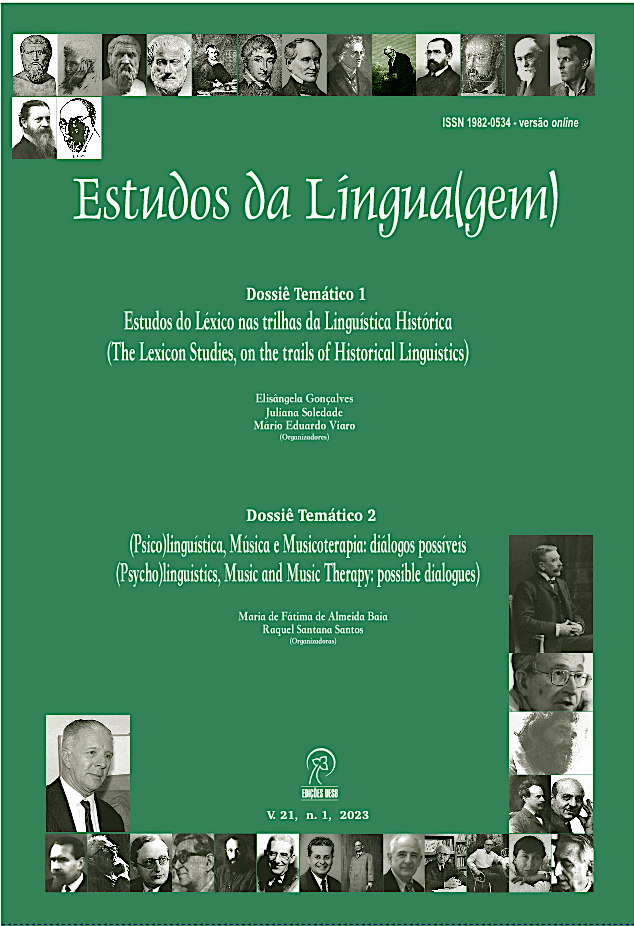Lexical units of African origin in Portuguese spoken in Luanda-Angola
DOI:
https://doi.org/10.22481/el.v21i1.10233Keywords:
Lexicon, Portuguese., African languages., Luanda.Abstract
This work aims to identify and present some lexias of African origin in Portuguese spoken in Luanda, in order to test the hypothesis that there are African-based lexias in Portuguese spoken in Luanda and that some assume a new meaning, taking into account the situations of linguistic contact. As a methodology, we considered, first, the lexia present in the corpus and, with the help of the Antconc computational tool, a list of words that could be analyzed was elaborated. The analyses were made considering the works of Assis Júnior (1947), Castro (2001; 2002) and Coutinho (2010). The results confirm that there are African-based lexias in the Portuguese language spoken in Luanda and that some of them have different meanings than traditional ones. These facts are due to the contact of the native languages with Portuguese.
Downloads
References
ALKMIM, T.; PETTER, M. M. T. Palavras da África no Brasil de ontem e de hoje. África no Brasil: a formação da língua portuguesa. São Paulo: Contexto, 2008, p. 145-178.
ÁLVAREZ LÓPEZ, L. Como avançar no estudo do léxico de origem africana na América Latina?. Revista da ABRALIN, Curitiba v. 11, n. 2, 2012, p. 203-255.
ANGOLA. Constituição da República de Angola 2010. Artigo 19.º Línguas, Luanda, 2010. Disponível em: <http://tribunalsupremo.ao/wp-content/uploads/2018/05/constituicao-da-republica-de-angola.pdf>. Acesso em: 24 jan. 2021.
ARAUJO, P. J. P.; PETTER, M. M. T; JOSÉ, J. A. Variedades do português angolano e línguas bantas em contato. In.: OLIVEIRA, M. S. D.; ARAÚJO, G. A. (org.). O português na África Atlântica. São Paulo: Humanitas: FAPESP, 2018, p. 17-47.
ARAUJO, S. S. F.; DANTAS, N. S. Os verbos ter e haver existenciais no português falado em Luanda-Angola. Letrônica, Porto Alegre, v. 10, n. 1, jan. p. 64-81, 2017.
ASSIS JUNIOR, A. Dicionário Kimbundu-Português: linguístico, botânico, histórico e corográfico seguido de um índice alfabético dos nomes próprios. Luanda: Argente, Santos e Comp., 1947.
AVELAR, J.; GALVES, C. Concordância locativa no português brasileiro: questões para a hipótese do contato. In: MOURA, M. D. (org.). Para a história do português brasileiro. Maceió: Edufal, 2013, p. 103-132.
BIDERMAN, M. T. C. Os dicionários na contemporaneidade: arquitetura, métodos e técnicas. In: OLIVEIRA, A. M. P. P. de; ISQUERDO, A. N. (Org.). As ciências do léxico: lexicologia, lexicografia, terminologia. Campo Grande: UFMS, 1998b, v. 1, p. 129- 142.
BONVINI, E. Os vocábulos de origem africana na constituição do português falado no Brasil. África no Brasil: a formação da língua portuguesa. São Paulo: Contexto, 2008, p. 101-144.
CASTRO, Y. P. A influência das línguas africanas no português brasileiro. Salvador: Secretaria Municipal de Educação-Prefeitura da Cidade de Salvador, 2005, p. 3-12.
CASTRO, Y. P. A língua mina-jeje no Brasil; um falar africano em Ouro Preto no século XVIII. Belo Horizonte: Fundação João Pinheiro/Séc. de Estado da Cultura, 2002.
CASTRO, Y. P. Falares africanos na Bahia: um vocabulário afro-brasileiro. Rio de Janeiro: Topbooks, 2001.
COUTINHO, N. R. Dicionário: palavras oriundas de línguas que mais contribuíram para a formação da língua portuguesa falada no Brasil: africanas, árabe, espanhola, francesa, inglesa, italiana e tupi. Salvador: Quarteto Editora, 2010, p. 25-92.
FIORIN, J. L.; PETTER, M. M. T. (org.). África no Brasil: a formação da língua portuguesa. São Paulo: Contexto, 2014.
HINE, B.; NURSE, D. (org.) African languages: an introduction. Cambridge/New York: Cambridge University Press, 2000.
INVERNO, L. A transição de Angola para o Português: uma história sociolinguística. In: TORGAL, J. R.; PIMENTA, F.T; SOUSA, J. J. (org.). Comunidades imaginadas: nação e nacionalismos em África. Coimbra: Imprensa da Universidade de Coimbra, 2008, p. 117-129. Disponível em: https://digitalis-dsp.uc.pt/jspui/bitstream/10316.2/32154/1/9%20liliana%20inverno.pdf?ln=pt-pt. Acesso em 13 jul. 2020.
KUKANDA, V. Diversidade linguística em África. Africana Studia, n. 3, p.101-107, 2020.
LEWIS, M. P.; SIMONS, G. F.; FENNIG, C. D. Ethnologue: languages of the world 17. Dallas, Texas: SIL International, 2014.
MACEDO SOARES, A. J. Dicionário brasileiro da língua portuguesa. Rio de Janeiro: Instituto Nacional do Livro, 1954-1955 [1875-1888].
MINGAS, A. A. Interferência do Kimbundu do português falado em Luanda. Luanda: Caninde, 2000.
OLIVEIRA, G. M. Política linguística e internacionalização: a língua portuguesa no mundo globalizado do século XXI. Trabalhos em linguística aplicada, v. 52, n. 2, p. 409-433, 2013.
PETTER, M. M. T. Línguas africanas no Brasil. África, n. 27-28, p. 63-89, 2007.
PETTER, M. M. T. A classificação das línguas da África. In: _____. Introdução à Linguística Africana. São Paulo: Contexto, 2015 p. 49-85.
PETTER, M. M. T. As línguas no contexto social africano. In: _____. Introdução à Linguística Africana. São Paulo: Contexto, 2015, p. 193-120.
SILVA, M. C. A.; SENE, M. G.; ARAÚJO, S. S. F. Notas sobre o português falado em Luanda: um estudo sobre sócio-história e crenças linguísticas. Miguilim-Revista Eletrônica do Netlli, Crato, v. 7, n. 2, p. 337-353, 2018.
TARALLO, F. L.; ALKMIM, T. M. Falares crioulos: línguas em contato. Editora Atica, 1987.
TEIXEIRA, E. S. P.; ALMEIDA, N. L. F. A indeterminação do sujeito no português angolano: uma comparação com o português do Brasil. PAPIA-Revista Brasileira de Estudos do Contato Linguístico, São Paulo, v. 21, n. 1, p. 99-111, 2011.
TIMBANE, A. A.; SANTANA, Y. F. D.; AFONSO, E. V. S. A cultura hip-hop e os angolanismos lexico-semanticos em Yannick Afroman: a língua e a cultura em debate. Afluente: Revista de Letras e Linguística, Bacabal, v. 4, n. 12, p. 104-128, 2019.
Downloads
Published
How to Cite
Issue
Section
License
Copyright (c) 2023 Language Studies

This work is licensed under a Creative Commons Attribution 4.0 International License.

Estudos da Língua(gem) is licensed under a Creative Commons Attribution 4.0 International License.
Authors who publish in the journal Estudos da Língua (gem) agree with the following terms:
The journal Estudos de Língua(gem) maintains the copyrights of the contributions published. These rights include the publication of the contribution and make its content available for free through the portal.







